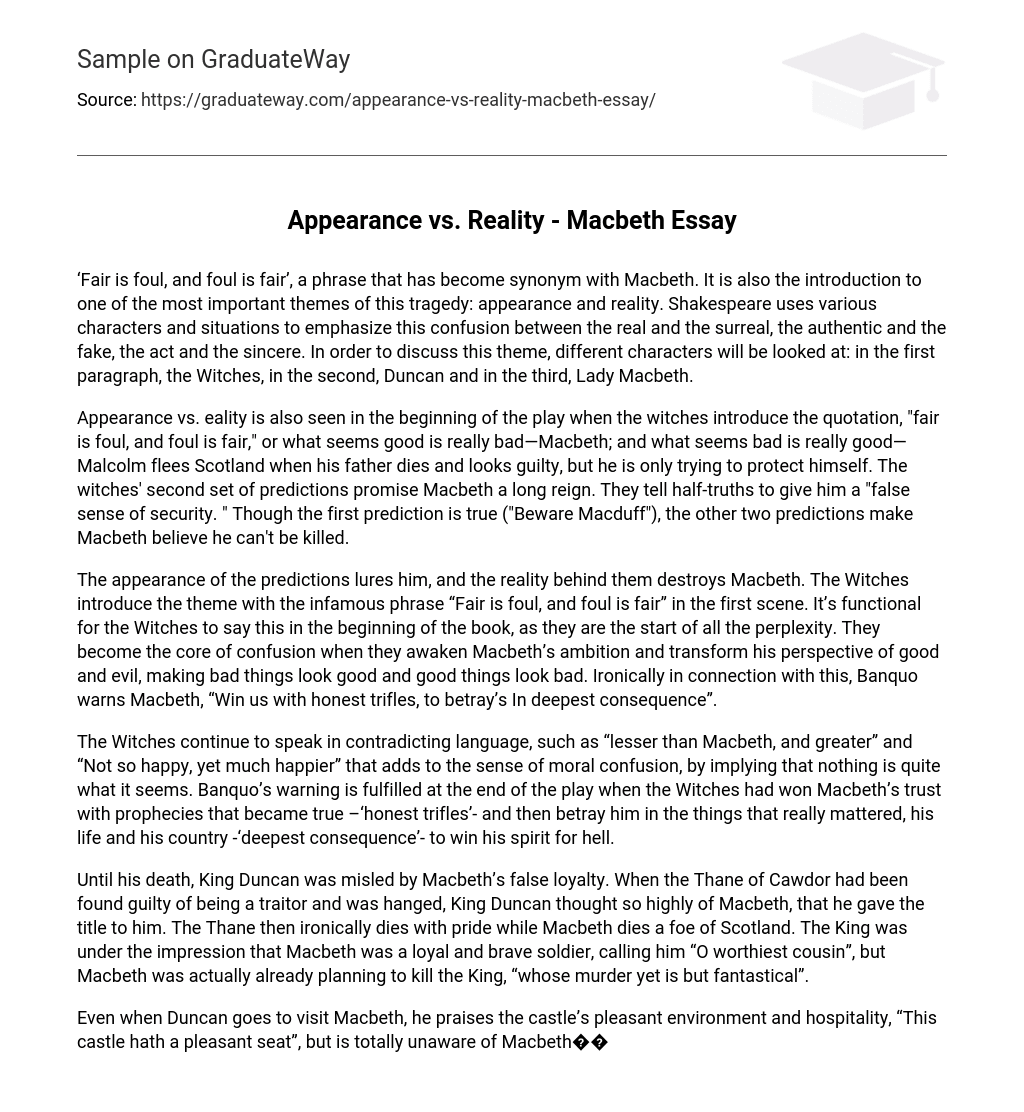‘Fair is foul, and foul is fair’, a phrase that has become synonymous with Macbeth. It is also the introduction to one of the most important themes of this tragedy: appearance versus reality. Shakespeare uses various characters and situations to emphasize this confusion between what is real and surreal, authentic and fake, act and sincere. To discuss this theme, different characters will be examined: in the first paragraph, the Witches; in the second paragraph, Duncan; and in the third paragraph, Lady Macbeth.
Appearance versus reality is a theme that is introduced at the beginning of the play when the witches utter the quote, “fair is foul, and foul is fair.” This means that what appears to be good may actually be bad, as in Macbeth’s case. Conversely, what seems bad can actually be good, as seen when Malcolm flees Scotland after his father’s death. Although he appears guilty, he is only trying to protect himself.
The witches’ second set of predictions promise Macbeth a long reign. However, they tell him half-truths to give him a false sense of security. While their first prediction (Beware Macduff”) comes true, the other two predictions make Macbeth believe that he cannot be killed.
The appearance of the predictions lures Macbeth in, but the reality behind them ultimately destroys him. The theme is introduced by the Witches in the first scene with their infamous phrase, “Fair is foul, and foul is fair.” This statement serves a purpose as they are the catalyst for all of the confusion that follows. They awaken Macbeth’s ambition and transform his perspective on good and evil, making bad things look good and vice versa. Ironically, Banquo warns Macbeth with the words “Win us with honest trifles to betray us in deepest consequence”.
The witches continue to speak in contradictory language, such as lesser than Macbeth, and greater” and “Not so happy, yet much happier.” This adds to the sense of moral confusion by implying that nothing is quite what it seems. Banquo’s warning is fulfilled at the end of the play when the witches had won Macbeth’s trust with prophecies that became true – “honest trifles” – and then betray him in the things that really mattered: his life and his country – “deepest consequence” – to win his spirit for hell.
Until his death, King Duncan was misled by Macbeth’s false loyalty. When the Thane of Cawdor was found guilty of being a traitor and hanged, King Duncan held Macbeth in high regard and bestowed upon him the title. Ironically, the Thane died with pride while Macbeth died as an enemy of Scotland. The King believed Macbeth to be a loyal and brave soldier, referring to him as O worthiest cousin,” but in reality, Macbeth was already plotting to kill the King – “whose murder yet is but fantastical.”
Even when Duncan visits Macbeth, he praises the pleasant environment and hospitality of the castle: This castle hath a pleasant seat.” However, he is totally unaware of Macbeth’s plans to murder him. From our first meeting with Lady Macbeth, we get the impression of a strong-willed and bold person – an ideal wife. As the play progresses, Macbeth grows stronger while Lady Macbeth begins to despair, eventually committing suicide and proving to be the antithesis of an ideal wife.
She seems to lack a conscience, as evidenced by her statement, A little water clears us of this deed.” However, towards the end of the play, her conscience drives her mad and she sleepwalks while washing her hands and saying “Out, damned spot!” in reference to the blood she imagines is on her hands due to her plaguing conscience. Interestingly, Macbeth’s first line in the play is “So foul and fair a day I have not seen,” suggesting that he is the focus of the play’s moral confusion.
Within him, the conflict between good and evil continues, ultimately driving him to his death. It is clear that Shakespeare identified in life what he saw as the world’s fatal flaw: the inability to distinguish between appearance and reality. He used Macbeth as a tool to communicate this message. Throughout the play, deceitful appearances influence the entire plot. This theme is exemplified through Macbeth’s perception of Kingship as a form of security and prestige, only to be faced with even stronger feelings of insecurity and fear.





